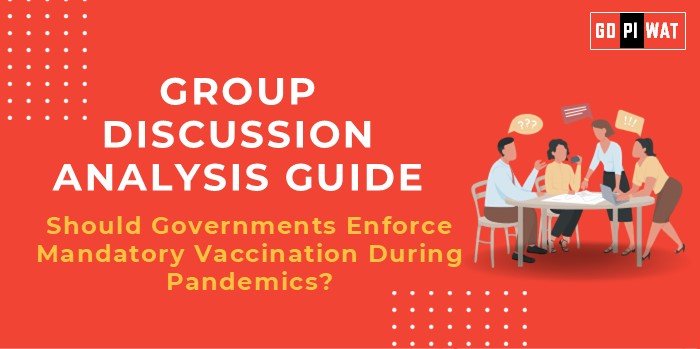📋 Group Discussion and WAT/Essay Analysis Guide: Should Governments Enforce Mandatory Vaccination During Pandemics?
🌐 Understanding the Topic’s Importance in a B-School Context
Mandatory vaccination during pandemics is a compelling topic that intersects public health, ethics, and governance. It challenges students to think critically about balancing public good with individual freedoms and legal frameworks. In B-school contexts, this topic fosters discussions on leadership during crises, policymaking, stakeholder management, and global healthcare strategies. It sharpens analytical and decision-making skills, encouraging solution-oriented approaches grounded in ethical considerations.
📝 Advanced Planning and Structure Strategy
Time Allocation Tips:
- 🕒 Brainstorming (5 minutes): Identify key perspectives (public health, individual rights, economic impact).
- 🖊️ Outlining (5 minutes): Sketch main sections—context, pros, cons, solutions, and conclusion.
- ✍️ Writing (15 minutes): Focus on clear, impactful arguments supported by data.
- 🔍 Reviewing (5 minutes): Ensure coherence, data accuracy, and alignment with the topic.
Preparation Techniques:
- 📊 Research Key Statistics: Use reliable sources like WHO and CDC to back arguments (e.g., COVID-19 vaccination rates).
- 👥 Stakeholder Analysis: Consider the perspectives of governments, healthcare providers, citizens, and global organizations.
- 📖 Case Studies: Gather examples like smallpox eradication or resistance to COVID-19 mandates in the US.
💡 In-Depth Introduction Techniques for Essays
- 📊 Data-Driven Introduction: “According to the WHO, vaccines prevent 4–5 million deaths annually. Yet, mandating them during pandemics ignites debates over personal liberty and public health priorities.”
- 🔍 Analytical Introduction: “The enforcement of mandatory vaccination during pandemics highlights the tension between collective welfare and individual autonomy, necessitating a nuanced approach to policy.”
- 🌍 Comparative Introduction: “While countries like Israel showcased high vaccination rates through mandates, others like the US faced significant resistance, illustrating diverse responses to a global challenge.”
📖 Comprehensive Structure for Essay Body
- Achievements and Supporting Data:
- Vaccines as life-saving tools: Over 80% reduction in COVID-19 hospitalizations among vaccinated populations (CDC).
- Examples: India’s polio eradication campaign through mandatory immunization drives.
- Challenges with Comparative Analysis:
- Vaccine Hesitancy: Rooted in misinformation and cultural beliefs (e.g., low uptake in parts of the US).
- Ethical Dilemmas: Balancing individual freedoms versus societal safety, especially in democracies.
- Comparisons: Israel’s success with mandates versus resistance in France.
- Forward-Looking Solutions:
- Education campaigns to combat misinformation.
- Incentivizing vaccinations instead of strict enforcement in sensitive regions.
- International collaboration for equitable vaccine distribution.
✍️ Detailed Conclusion Techniques with Global Relevance
- ⚖️ Balanced Conclusion: “Mandatory vaccination serves as a critical public health tool but must be paired with education and equitable access to address hesitancy and build public trust.”
- 🌍 Global Comparative Conclusion: “From Israel’s successes to challenges faced by the US, global lessons underscore the need for tailored policies that respect cultural contexts while safeguarding public health.”
🔍 Expanded Analysis of Key Achievements and Shortcomings
Achievements:
- 💉 Vaccines’ role in reducing mortality rates during pandemics.
- 📉 Economic benefits of preventing widespread illness (e.g., reduced healthcare costs).
- 🛠️ Historical successes: Smallpox eradication through universal immunization.
Challenges:
- ⚖️ Legal and ethical resistance in democratic societies.
- 🌍 Access inequities: Developing nations often lag in vaccine distribution.
- 📣 Misinformation campaigns, amplified by social media.
🌏 Global Context:
- 🇯🇵 Success stories: High compliance in Japan and South Korea.
- 🇺🇸 Failures: Anti-vaccine movements in the US hindering herd immunity.
🎯 Recommendations for Sustainable Progress
- 🤝 Public-private partnerships for vaccine distribution.
- 📜 Implement targeted policies like high-risk group mandates.
- 📢 Increase funding for education campaigns to counter misinformation.
✍️ Two Full 500-Word Sample Essays
Essay 1: Balanced Perspective Essay
Introduction: Mandatory vaccination policies have historically played a pivotal role in controlling pandemics. However, enforcing such measures raises significant questions about individual freedoms and ethical governance.
Body: Vaccines are among the most effective tools for disease prevention. For instance, India’s polio eradication campaign owes its success to mandatory vaccination. During the COVID-19 pandemic, countries with high vaccination rates, like Israel, saw fewer hospitalizations and quicker economic recovery. However, challenges persist. Vaccine hesitancy fueled by misinformation and fears of adverse effects is a major barrier. Moreover, enforcing mandates in democracies can lead to public backlash, as seen in the US, where protests erupted over COVID-19 vaccine requirements. To balance public health and individual rights, governments must adopt nuanced strategies. Instead of strict mandates, incentivizing vaccinations and conducting widespread educational campaigns can yield better compliance. International collaboration is also critical to address inequities in vaccine distribution, ensuring global safety.
Conclusion: While mandatory vaccination is vital for managing pandemics, governments must implement it thoughtfully. Pairing mandates with education and equitable access can ensure both public health and societal harmony.
Essay 2: Solution-Oriented Approach
Introduction: Pandemics pose unprecedented challenges, requiring decisive action. While vaccines are critical for containment, enforcement strategies must address hesitancy and inequity to achieve global health security.
Body: Despite their life-saving benefits, vaccines often face resistance. For example, during the COVID-19 pandemic, only 50% of Americans expressed trust in vaccine safety. Governments must focus on education to counter misinformation, which is a root cause of hesitancy. Expanding access in rural and underserved areas is equally crucial; during the same pandemic, many African nations struggled with vaccine shortages. Proposed solutions include implementing targeted mandates for high-risk groups, such as healthcare workers, and providing incentives for broader populations. Additionally, global collaboration on vaccine research and distribution can reduce disparities, ensuring no country is left behind.
Conclusion: A combination of targeted enforcement, education, and equitable access is essential to make vaccination campaigns successful during pandemics. Governments must strive for strategies that respect cultural differences while prioritizing public health.


